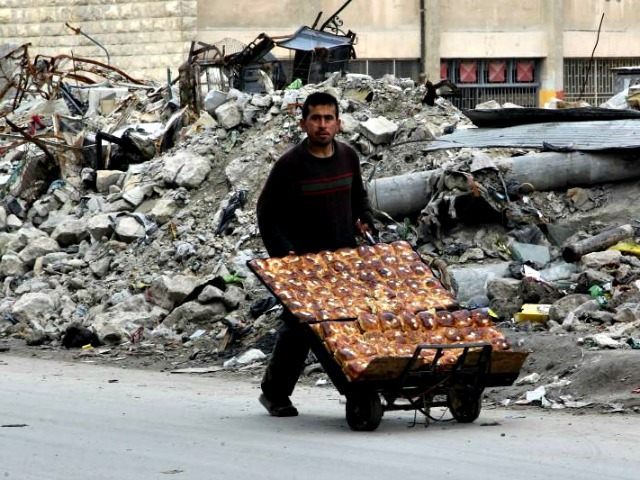On Friday, the United States, Russia, and other world powers announced a “cessation of hostilities” to begin next week in Syria, even as Syrian dictator Bashar Assad vowed to continue “fighting terrorism” and “retake” the entire country.
The Washington Post’s report on the big announcement immediately cast doubt upon just how much “cessation” we can expect. Secretary of State John Kerry said the declaration was “unanimous,” but hedged by saying it was merely unanimous “words on paper,” and “What we need to see in the next few days are actions on the ground.”
Those actions on the ground will apparently still involve Russian bombs detonating, just not quite as many of them:
Russian Foreign Minister Sergei Lavrov said the projected date for ending at least some of his country’s airstrikes in Syria is a week from Friday, but he emphasized that “terrorist” groups would continue to be targeted, including the Islamic State and Jabhat al-Nusra, an al-Qaeda affiliate in Syria that is involved in the fight against President Bashar al-Assad. The group in some instances fights alongside rebel forces supported by the United States and its allies.
The determination of eligible targets and geographic areas is to be left up to a task force of nations, headed by Russia and the United States, that will adjudicate differences of opinion. It is expected but by no means guaranteed that signatories to the agreement will be able to persuade their proxies and allies on the ground, including Assad and the hundreds of opposition groups fighting against him, to honor the terms.
Kerry and Lavrov emphasized that the agreement is not perfect and will require the goodwill and determination of all involved.
Not much “goodwill” could be detected in the interview with Syrian dictator Bashar Assad posted by AFP shortly after Kerry’s announcement. He vowed that his armed forces would “retake all of Syria,” acting against “terrorist” forces “without any hesitation.”
Assad then complained that due to the involvement of outside parties – i.e. the diplomats currently bubbling about a cessation of hostilities – his “solution” to the Syrian civil war “will take a long time, and incur a heavy price.”
The Syrian dictator also rejected United Nations allegations of war crimes perpetrated by his military and allied forces, and gave Europe a veiled warning that more refugees, with more terrorist mixed in, would be coming their way, if Western nations did not withdraw their support from opposition groups and let Assad finish them off.
Russian Foreign Minister Lavrov spoke of a “qualitative” change in U.S. policy, moving away from calls to ramp down Russian airstrikes to a process of active U.S.-Russian cooperation, which would mean the United States was helping Russia take out Assad’s opposition. Kerry, of course, acted like he had no idea what Lavrov was talking about.
The U.S. also seemed taken aback by Russian allegations that American planes were responsible for the recent bombing of two hospitals in Aleppo.
The best anyone seems to be realistically hoping for is reducing the bloodbath around the Syrian city of Aleppo, and making it safer for humanitarian aid to reach besieged civilians. The Washington Post speculates that if Assad’s patrons in Russia and Iran do consider a reduction of hostilities, or actual cease-fire, it will be because they have largely accomplished their objectives, making it possible for the Syrian military to recapture Aleppo.
With a little more bloodshed, Russia, Iran, and Syria can hope to break the back of Assad’s effective military opposition, bringing more amenable rebel factions to the table for a negotiated settlement that will fall well short of ejecting the Assad regime from power, and isolating the Islamic State as a final enemy, which the international coalition will destroy on Assad’s behalf.
While U.S. Secretary of State Kerry was talking about working toward a cease-fire and negotiated settlement of the Syrian civil war, Russia left no doubts about what it expects the ultimate resolution to look like.
“Just look at what happened in Afghanistan and many other countries,” said Russian Prime Minister Dimitry Medvedev. “The Americans and our Arab partners must think well: do they want a permanent war? It would be impossible to win such a war quickly, especially in the Arab world, where everybody is fighting against everybody. All sides must be compelled to sit at the negotiating table, instead of unleashing a new world war.”
“You have no one power that can act alone,” Medvedev added. “You have Assad and his troops on one side and some grouping, which is fighting against the government on the other side. It is all very complicated. It could last years or even decades. What’s the point of this?”
On Thursday, one U.N. diplomatic source told Reuters the Russians were “stringing Kerry along” with talk about cease-fires and humanitarian issues, while they finished the business of arranging a battlefield victory for Assad: “It’s clear to everyone now that Russia really doesn’t want a negotiated solution but for Assad to win.”
Another diplomatic source summed up the Syrian endgame by saying, “It’ll be easy to get a ceasefire soon, because the opposition will all be dead. That’s a very effective ceasefire.”

COMMENTS
Please let us know if you're having issues with commenting.